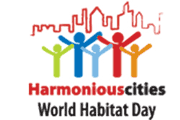6 October 2008: Top UN officials marked World Habitat Day by drawing attention to the need to raise awareness of the problems of rapid urbanization, its impact on the environment and the challenges of rising urban poverty.
The UN has designated the first Monday in October each year as World Habitat Day, to reflect on […]
 6 October 2008: Top UN officials marked World Habitat Day by
6 October 2008: Top UN officials marked World Habitat Day by
drawing attention to the need to raise awareness of the problems of rapid
urbanization, its impact on the environment and the challenges of rising urban
poverty. The UN has designated the first Monday in October each year as World
Habitat Day, to reflect on the state of towns and cities and the basic right to
adequate shelter for all. This year, Luanda, Angola, led the observance of the
celebration, which focused on the theme “Harmonious Cities.”
Anna Tibaijuka,
Executive Director, UN Human Settlements Programme (UN-HABITAT), noted that
“climate change is coming to the forefront of international debate at the same
time, and at virtually the same pace, as the world becomes urbanized.”
Underlining the amount of energy consumed and the greenhouse gases released by
cities, she stressed the need for cities to be an integral part of any
mitigation efforts. She added that reducing the carbon footprint of cities and
increasing their resilience will also improve the living conditions of urban
populations, including the most vulnerable. She emphasized the interlinkages
between climate change and urban poverty and called for combining adaptation and
mitigation efforts with improved land-use planning, more robust infrastructure
and smarter construction.
Also on the occasion, Ahmed Djoghlaf, Executive
Secretary of the Convention on Biological Diversity (CBD), underscored the role
played by cities and local authorities in designing and implementing land-use
and zoning planning tools, urban development and infrastructure guidelines,
investment promotion, and consumer awareness campaigns. He added that these
tools and measures have direct effects on biodiversity, and in particular on,
inter alia, water, climate change, protected areas, agriculture and forests,
and marine and coastal biodiversity. He explained that the CBD, in partnership
with the German Federal Agency for Nature Conservation and the German Federal
Ministry for the Environment, Nature Conservation and Nuclear Safety, launched
The Green Wave, a global campaign aiming to educate children and youth on
biodiversity and the need to reduce its loss and to enable young people to make
a tangible contribution towards both biodiversity conservation and climate
change mitigation. [UN
Press Release] [Anna
Tibaijuka’s speech] [Ahmed
Djoghlaf’s message]